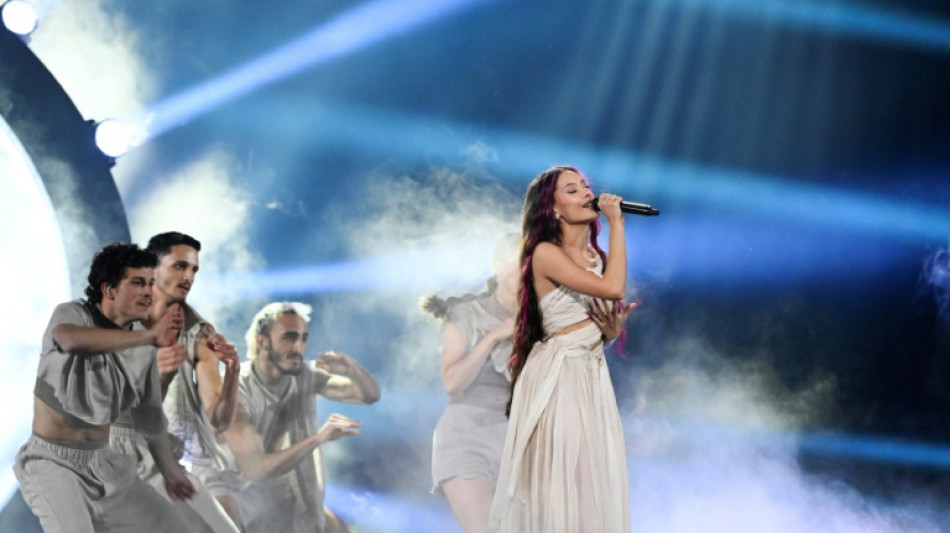
RBGPF
59.6900

After a run-up in the shadow of the war in Gaza, the Eurovision Song Contest final gets underway on Saturday in Sweden's Malmo, where representatives from 26 countries will compete.
Up to 30,000 demonstrators are expected to protest against Israel's participation in the competition over its offensive in Gaza on Thursday, when the country's representative Eden Golan takes part in the second semi-final.
In the big line-up of original acts, Croatia, Switzerland and Ukraine are favourites to win the affair distinguished by kitsch and rhinestones.
Inside the Malmo Arena, it's all neon lights, bright costumes and upbeat melodies.
Outside, despite the colourful decorations lining the streets, the mood is more sombre as heavily armed police patrol the city.
The Gaza war was sparked by Hamas's unprecedented October 7 attack on Israel, which resulted in the deaths of more than 1,170 people, mostly civilians, according to an AFP tally of Israeli official figures.
Militants also took about 250 hostages. Israel estimates 128 of them remain in Gaza, including 36 who officials say are dead.
Israel in response vowed to crush Hamas and launched a military offensive that has killed at least 34,844 people in Gaza, mostly women and children, according to the Hamas-run territory's health ministry.
Since October, pro-Palestinian rallies have been a regular occurrence in Malmo, which is home to the majority of Sweden's population of Palestinian origin.
Throughout the port city of more than 360,000 inhabitants, brightly coloured banners compete for attention with Palestinian flags hanging from windows and balconies.
Organisers have banned all flags other than those of the participating countries inside the arena, as well as all banners with a political message.
- 'Politics is everywhere' -
Last year, the European Broadcasting Union (EBU), which oversees the competition, banned Ukrainian President Volodymyr Zelensky from speaking in the arena in order to protect the neutrality of the event.
This neutrality was challenged on Tuesday during the first semi-final by Swedish singer Eric Saade, who took part in the opening number of the competition wearing a keffiyeh around his arm.
Swedish broadcaster SVT and the EBU condemned his gesture, insisting on the apolitical nature of the popular music festival -- which is more often associated with flashy performances.
"It's just its complete own world. It's a very joyful, colourful world, a world where I feel safe," said Nemo, a Swiss artist who identifies as non-binary and is one of the favourites.
Malmo is expecting up to 100,000 visitors, and for fans of the contest "it's what's on stage that is important", Andreas Onnerfors, professor of the history of ideas and a Eurovision specialist, told AFP.
Nearly 70 years old, Eurovision is "a colourful mix of people, a demonstration of European tolerance that doesn't exist in any other form or place", he stressed.
However, for the artists representing Ukraine, "politics is everywhere".
"Culture is a part of politics, so every song is political," rapper Aliona Savranenko, known by her artist name alyona alyona, told AFP over the weekend.
"There should be demonstrations, people should voice their opinions, people should boycott," Magnus Bormark, who is competing for Norway with his group Gate, told AFP.
Gate, like eight other contestants, have publicly called for a lasting ceasefire in Gaza.
Representatives of some countries considered boycotting the competition to protest Israel's participation, but decided against it in the end.
- 'Intensification' -
Security is a major concern, especially as Sweden raised its terror alert level last year following a series of protests involving desecrations of the Koran.
Security checks have been stepped up, in particular for access to the various sites, where bags will mostly be prohibited.
The police presence has also been strengthened, with reinforcements coming from Norway and Denmark.
But police spokesman Jimmy Modin said the first days of Eurovision week were calm and that there was no threat directed at the competition.
Some members of the Jewish community are planning to leave the city for the weekend.
"With Eurovision, there's a kind of intensification. The feeling of insecurity increased after October 7, and many Jews are worried," said Fredrik Sieradzki, a spokesman for local group The Jewish Community of Malmo.
"I can't really be happy about Eurovision, even though as a congregation we think it's good that everyone is welcome here in Malmo, including Israel," he added.
Security around the synagogue has been stepped up, while on social networks, threats have been directed at Israel's singer Golan.
As the final starts at 9:00 pm (1900 GMT) on Saturday, activists will be organising the first edition of Falastinvision in solidarity with the Palestinian people.
S.Mohideen--DT